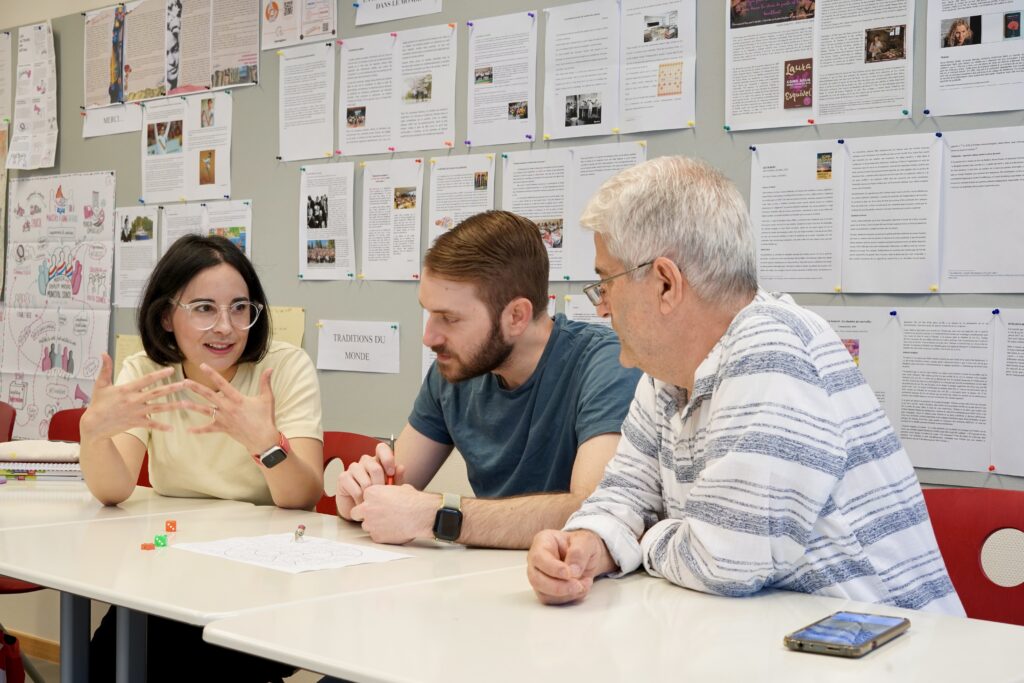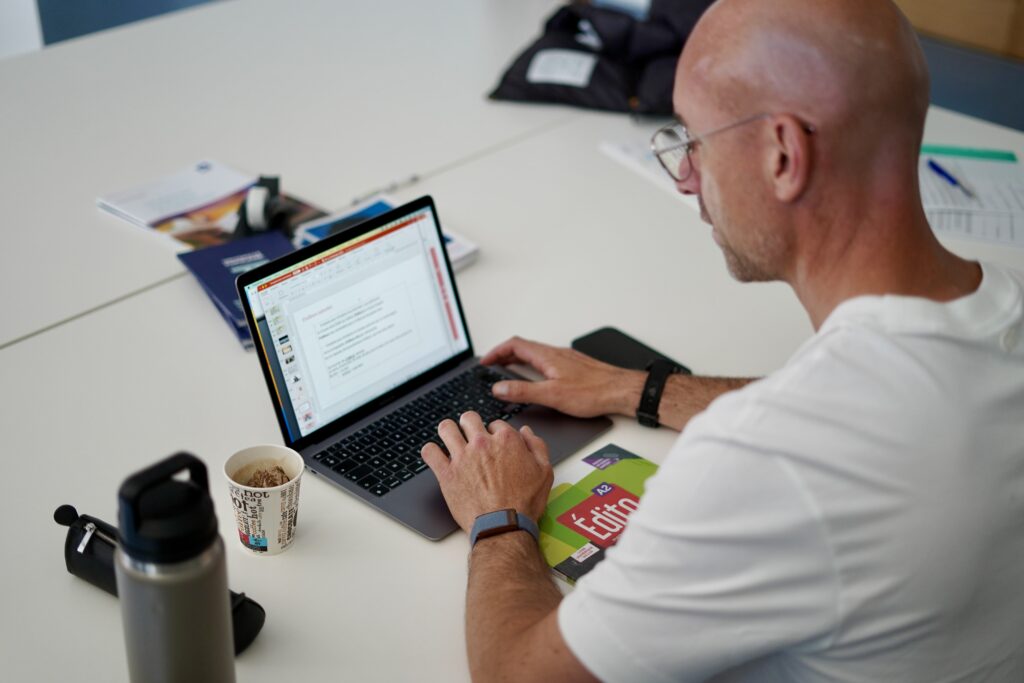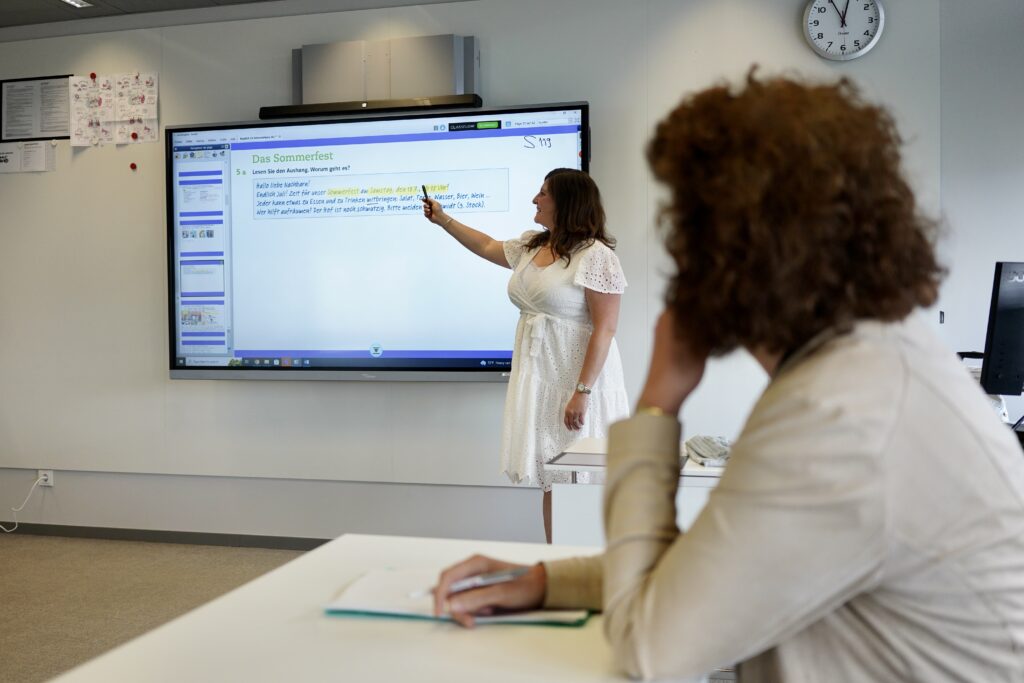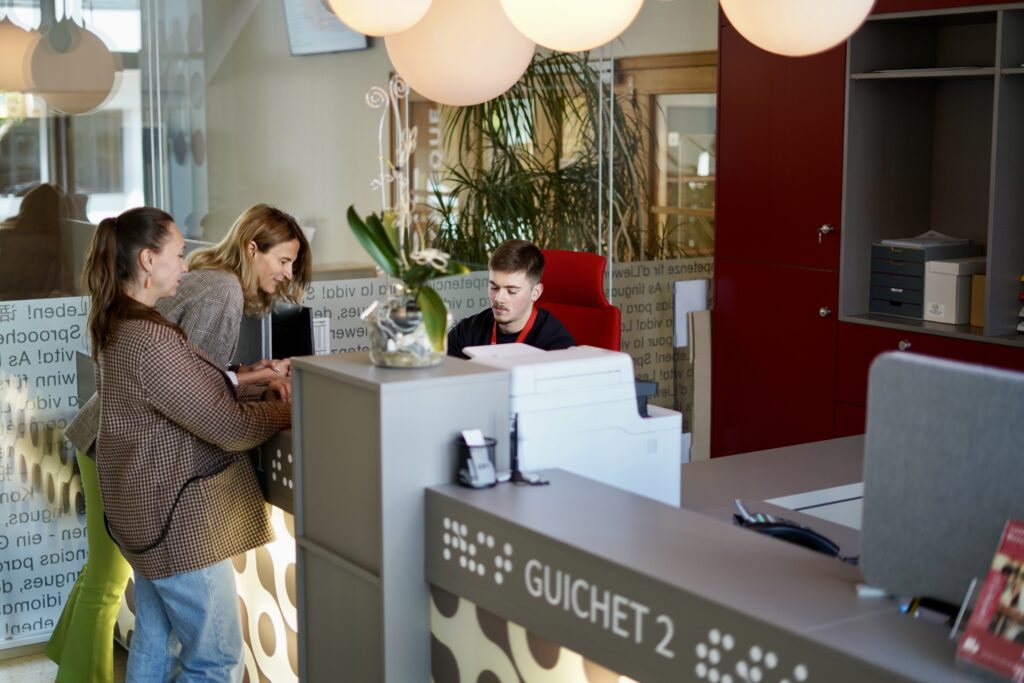
Our language courses
We focus on the power of dialogue on a daily basis. Our professional and committed language training team offers you courses in a pleasant and inspiring learning environment, so that you can develop your command of the language of your choice in the best possible conditions.
50, 100 or 200 minutes of language practice
Our language offer is entirely based on the guidelines of the Common European Framework of Reference for Languages (CEFR). We cover all language levels, starting with A1. Our teaching units are 50, 100 or 200 minutes long and make use of all the language resources of our learners. Our methodology focuses on the activation of oral communication and reinforces independent language practice, encourages reflection on learning processes and invites regular self-assessment.
The European Commission has set itself the objective of promoting a culture of lifelong learning. In this context, the Luxembourg government supports the learning of the Luxembourg language through a system of grants for Lëtzebuergësch courses. Find out more about financial support for your language course here.

Flexible teaching units
Our offer consists of different types of courses. Choose the course format that suits you best:

Standard course
- Subject to compulsory continuous assessments to progress to the next level throughout the semester and entitles you to a skills assessment.
- 2 x or 3 x per week (depending on level).
Compact course
- Subject to compulsory continuous assessment for progression to the next level throughout the semester and entitles the student to a skills assessment.
- Maximum 2 x per week.
- Target group: independent learners who are willing to invest time outside the course in their learning.


Standard Course + Enhanced Writing
- Subject to compulsory continuous assessment to move up to the next level throughout the semester and entitles the student to a skills assessment.
- Compared to the Standard course: written competence is worked on more in class.
Blended learning course
- Subject to compulsory continuous assessments to move up to the next level throughout the semester and entitles the student to a skills assessment.
- Alternating between classroom and distance learning. Both are compulsory and complementary.
- Classroom teaching: 1 or 2 x per week a 100-minute class.
- Distance learning: 1 x per week approximately 100 minutes of self-study.
- Target group: autonomous people who have computer equipment (PC, laptop) connected to the Internet and know how to use it.
- Good level of ability in word processing (Office, email, …) as well as the habit and/or willingness to use applications. Use of a cloud and/or online sharing platforms are necessary when taking an online course.


Workshop type courses
- Target group: people who want to maintain their language level or progress at a slower pace than the compact/standard course.
- Additional work outside the classroom may be required.
- Not subject to assessment and therefore not eligible for a skills assessment.
Intensive courses for professional purposes
- Duration: approximately 8 weeks.
- Subject to evaluation and entitles the student to a skills assessment.
- Target group: individuals who have the appropriate computer equipment (PC, laptop) securely connected to the Internet and are reasonably operational online in a work and/or learning context, ready to invest a minimum of 2 hours per day in learning specialised vocabulary (aim: socio-professional integration) outside of the course.


e-Learning courses
- These courses permit distance learning, at set times and days, by videoconferencing with the teacher and other class members via “Teams” or “Zoom”.
- 2 or 3 100-minute face-to-face online sessions per week
- Based on existing schemes of work using the Common European Framework of Reference for Languages (CEFR)
- Subject to compulsory continuous assessments to move up to the next level throughout the semester and entitles the student to a skills assessment.
- Target group: individuals who have the appropriate computer equipment (PC, laptop) securely connected to the Internet and are reasonably operational online in a work and/or learning context. (NB: A smartphone alone is not recommended)
- Good level of ability in word processing (Office, email, …) as well as the habit and/or willingness to use applications. Use of a cloud and/or online sharing platforms are necessary when taking an online course.
Hybrid courses
- These courses consist of face-to-face OR distance learning offered simultaneously at set times and days. Learners choose the type that suits them for each session (face-to-face or distance learning) except for 4 times during the semester, when all learners attend face-to-face classes on the first day of the course and on dates set at the beginning of the semester by the teacher. Equipment in the classroom enables the session to be broadcast on the internet using the Teams or Moodle platform.
- 2 or 3 sessions per week, for one semester
- Based on existing schemes of work using the Common European Framework of Reference for Languages (CEFR)
- Subject to compulsory continuous assessments to move up to the next level throughout the semester and entitles the student to a skills assessment.
- Target group: individuals who have the appropriate computer equipment (PC, laptop) securely connected to the Internet and are reasonably operational online in a work and/or learning context. (NB: A smartphone alone is not recommended)
- Good level of ability in word processing (Office, email, …) as well as the habit and/or willingness to use applications. Use of a cloud and/or online sharing platforms are necessary when taking an online course.

All courses, including courses for beginners, are given from the start in the target language concerned.
Course fees
All courses are subject to the registration fees indicated in the course offer on MyINL.
The cost of purchasing the necessary materials and/or the course book is not covered by the registration fee.
Under certain conditions, the registration fee is reduced to 10 € (see article 4 of the Grand-Ducal regulation of 27 June 2018 fixing the amount of registration fees for courses organised by the National Language Institute).


Enrolment for our language courses
Registration is a multi-stage process, including a placement test and a personal interview for new registrations (except for A1 beginner level). You can start the registration process throughout the year and get a recommended level which you can then use to select a course in September and February via our MyINL portal.
Lifelong learning
Are you interested in training in other areas as well? Take advantage of the numerous training aids here.

Common European Framework of Reference for Languages (CEFR)
The Common European Framework of Reference for Languages (CEFR) classifies foreign language skills into three levels: basic (A), autonomous (B) and competent (C).
You are able to communicate with simple words and phrases in your daily activities.
You are able to communicate in a simple way in everyday life.
You can deal with everyday situations and express yourself (sometimes with hesitation) on current affairs.
You can communicate fluently and relatively well on a wide range of subjects.
You are able to use the language effectively and flexibly.
At this level you are able to communicate effortlessly and grasp the fine nuances of meaning in relation to complex subjects.


